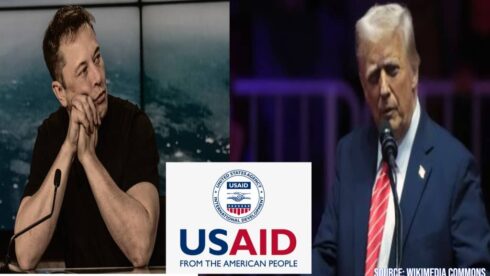Elon Musk, the tech magnate and CEO of Tesla and SpaceX, revealed that he recently held discussions with former President Donald Trump regarding the future of the United States Agency for International Development (USAID). According to Musk, both he and Trump agreed that the agency is “beyond repair” and should be permanently dismantled. He emphasized that the organization, initially established to promote international development and humanitarian aid, has lost its efficiency and purpose over time. This revelation has raised questions about the future of U.S. foreign aid programs and the role of private-sector alternatives in addressing global development challenges.
The disclosure came during a live Q&A session on X (formerly Twitter), where Musk fielded questions on various topics, including government inefficiencies and foreign aid spending. His comments quickly ignited a firestorm of reactions across political and social media landscapes. While some praised Musk for his bold critique of USAID, others criticized his stance as uninformed and overly dismissive. Political analysts have noted that the discussion reflects growing public dissatisfaction with government spending on international aid amidst domestic economic challenges.
Elon Musk’s Critique of USAID: Inefficiency and Waste
Elon Musk described USAID as a bureaucratic behemoth plagued by inefficiencies and mismanagement. “The agency has become a black hole for taxpayers’ money, with little accountability or measurable impact,” he claimed during the session. He emphasized that despite its initial noble mission to provide humanitarian aid and development assistance, USAID’s operations have become outdated and ineffective.
He further argued that technological innovations and private-sector initiatives could better address global development challenges. “We need agile, tech-driven solutions, not bloated government institutions stuck in the past,” Elon Musk stated, urging for a complete rethinking of U.S. foreign aid strategies.
President Trump’s Alleged Agreement
According to Elon Musk, President Trump was receptive to the idea of shutting down USAID. “He agreed with me—it’s time to shut it down,” Elon Musk asserted. Trump, known for his critical stance on U.S. foreign aid, has previously questioned the effectiveness of such programs during his presidency.
While the former president has not officially commented on Musk’s claims, political analysts believe this aligns with his long-standing skepticism toward government spending on international aid. Trump’s administration had previously attempted to cut USAID’s budget, citing a need for fiscal responsibility.
Political Backlash and Public Reactions
The revelation sparked immediate backlash from political figures and development experts. Democratic lawmakers criticized Musk’s statements, accusing him of undermining critical humanitarian efforts that have saved countless lives worldwide. Senator Elizabeth Warren called Elon Musk‘s comments “reckless” and “misinformed.”
Conversely, several conservative commentators praised Elon Musk for highlighting government inefficiencies. “He’s right. USAID has become a bloated, ineffective institution,” said political analyst Ben Shapiro. The public response has been equally polarized, with hashtags like #DefundUSAID and #SaveUSAID trending on social media.
Implications for U.S. Foreign Policy
If USAID were to be dismantled, it would mark a significant shift in U.S. foreign policy. The agency has played a pivotal role in promoting democracy, responding to natural disasters, and addressing health crises globally. Experts warn that shutting down USAID could undermine America’s soft power and diplomatic influence.
On the other hand, proponents of the idea argue that reallocating funds to domestic priorities or private-sector-led initiatives could yield better results. “It’s time for a new approach—one that delivers real impact without wasting taxpayers’ money,” Musk emphasized.
What’s Next for USAID?
While Elon Musk‘s comments have reignited debates about government efficiency, there is no official indication that USAID is on the chopping block. The Biden administration continues to support the agency, viewing it as a critical tool for advancing U.S. interests abroad.
Nonetheless, Elon Musk‘s influence and public platform ensure that the conversation around USAID’s future will persist. As public sentiment shifts and technological advancements redefine global development, the agency may face increasing pressure to modernize or risk becoming obsolete.














